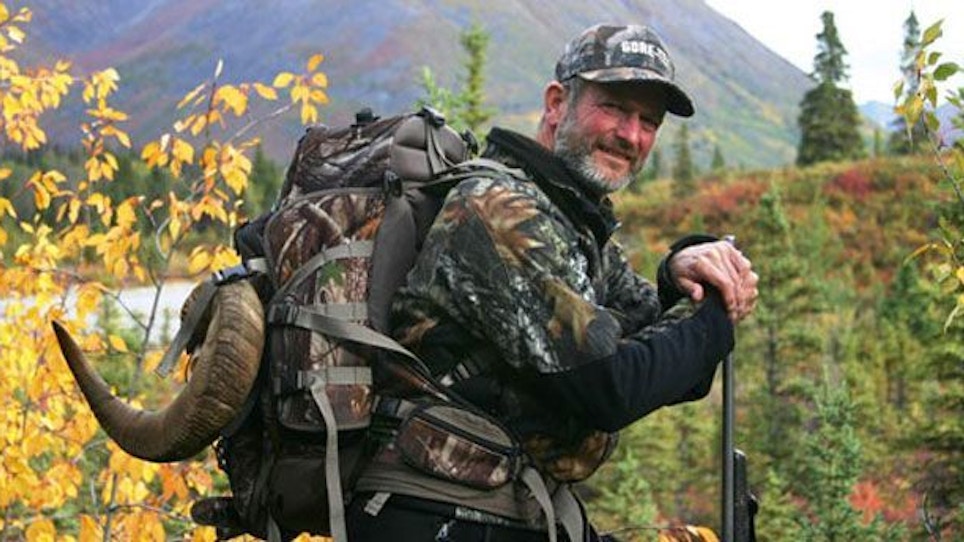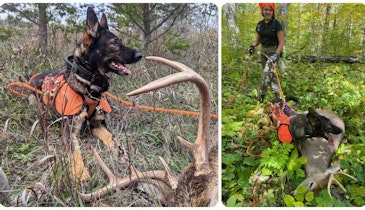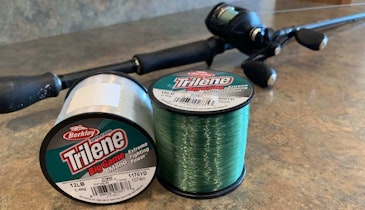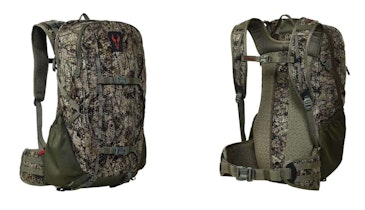.JPG)
I’ve had my share of hair-raising experiences, but thankfully, none of them left me injured beyond the normal scratches, bumps and bruises associated with one of my typical excursions.
Others however, have had the misfortune of having their outdoor experiences indelibly etched into their bodies. In fact, sometimes life can change in the blink of an eye.
Bob Robb — Broken And Alone After A Mountain Fall
Whitetail Journal editor Bob Robb lived in Alaska for 15 years, where he guided and hunted his way across the Last Frontier. During his residency, he developed a penchant for Dall sheep hunting and normally hunted alone. Usually, Robb would select a hunting area and employ an air taxi to fly him there and pick him up after the hunt.
Several years ago on a mild August day, Robb experienced the downside of hunting Alaska alone. After being dropped off early one morning by a bush plane, Robb began still-hunting the slopes in search of a trophy Dall ram. He spied a band of sheep in the distance, but failed to see a desirable ram.
At 6 a.m., he began a slow arduous trek across the shale-strewn mountain, to gain a better vantage point to glass for sheep. The steep mountain made the trek very slow for Robb, who carried an 80-pound backpack. While he inched across the precarious slope, a sliding rock struck Robb’s pack and knocked him down the mountain. His tumble over the sharp rocks became a feet-first slide, while lying on his back. In an effort to stop, Robb frantically tried to push his hands into the shale to stop his descent.
After falling 150 feet, he came to a stop. Robb never felt pain because he was in shock, but he had broken his leg and shattered his ankle in six places. In addition, one of his fingers was nearly ripped off during the slide.
“My wilderness medicine training taught me that if I was going to survive, it was up to me,” recalls Robb. “I knew I couldn’t panic and I would have to rely on the medical kit in my backpack.”
Amazingly, Robb’s bulky backpack had protected his head and back from serious injury. Bruised, battered and broken, Robb contemplated his next move. He knew his hand and leg injuries would make it nearly impossible to get back up the hill, so he decided to move down the slope, where there was a creek 500 feet below. Slowly and methodically Robb agonized as he lifted his upper body while sliding his legs forward, mere inches at a time. The tedious descent took 10 hours to accomplish, but being a mountain guide left Robb in incredible shape — a factor that probably led to his survival.
Robb lay at the bottom of the mountain exhausted, and then it dawned on him that he had a battery-powered walkie-talkie in his pack. He carried the radio since the area he was hunting offered no cell phone reception, and hardly anyone used satellite phones back then. As he lay back resting, he was stirred by an airplane sound high above the clouds.
“I knew that most pilots have an emergency frequency they use, so I set my walkie-talkie to that channel and began making a may-day call,” he said. “Almost instantly the aircraft responded, and I about freaked out. It took me a while, but I finally convinced the pilot that it wasn’t a hoax, I was really injured and needed to be air-lifted out.”
Thirty minutes later at 7 p.m., a helicopter arrived and took Robb to Providence Hospital in Anchorage — nearly 200 miles away. Upon arrival, Rob was taken into the ER where they began to work on saving his little finger, although they warned that amputation might be necessary. In the end, his pinky was spared and surgeons began to mend his broken leg and ankle with 3-inch screws and a 6-inch plate in his leg.
Robb wore a cast for nearly a month, and went through rehab until he contracted hammertoe from his injuries. Hammertoe is a painful condition where the smaller toes point upward at the base and then bend downward at the tips. If left untreated, this condition can be debilitating to the entire foot. Another operation fused his toes straight, and when the cast was removed, his atrophied leg was one-third smaller than his other leg.
Today Robb is fully recovered and cites the Alaskan experience as a teachable moment in his life. “I promised my wife I would never hunt alone again,” Robb stated. “You just have to be prepared for the worst. In Alaska, you always dress for survival, and one thing you learn is that eventually something is going to happen. Most people worry about bears; I worried more about the ocean — getting wet and getting hypothermia. It really makes you contemplate every move you make.”
A year later Robb returned to Alaska with a friend and killed a ram on the last day of the hunt. “Though the ram wasn’t the biggest ram I’ve ever killed, it means as much to me as anything I’ve ever taken,” said Robb. “My philosophy is when bad things happen, you need to face your fears and get back on the horse that threw you.”






